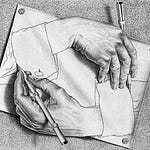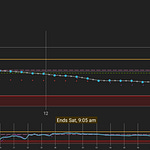I’m Bryan Kam. I endeavour daily to make philosophy accessible and relevant. To that end I write this newsletter and host a podcast called Clerestory. I’m also writing a book called Neither/Nor and I’m a founding member of Liminal Learning. In London, I host a book club, a writing group, and other events. My work looks at how abstract concepts relate to embodied life, and how to use this understanding to transform experience.
Good news!
As regular readers will know, I submitted my first academic paper in April of this year.
As of yesterday, Springer Nature confirmed that the paper has gone to peer review — and so far, six reviewers have agreed to review it! This is huge for me, although I’m a bit nervous about the review process, which I understand can be challenging. Still, this is cause for celebration.
A Talk on Concepts and Perception
Last week, I had the pleasure of speaking at Philosophy for All (on 7 July 2025).
Philosophy for All does a wonderful monthly meeting — hybrid in London and on Zoom — called Kant's Cave, and Anja Steinbauer invited me to give the July talk. I chose to speak about one aspect of the aforementioned article. I focused on the ancient Indo-European divide between conceptual thinking and embodied perception. I spoke for 51 minutes before taking questions, and you can watch it at the top of this very post.
The Setup
Imagine this: I ask you, “What is virtue?” You start to think of definitions, to categorise, to relate concepts to one other.
Now contrast those operations with taking three deep breaths, feeling the air move in and out of your body, attending to the sensation.
That’s the difference I’m writing about — between abstract reasoning and embodied experience — and it’s what I explored in this talk. It’s a divide that goes back to ancient Greece and India, shaped Western philosophy for millennia, and still affects how we navigate everything from cooking dinner to workplace KPIs.
A Personal Entry Point
I came to this topic through lived experience. As someone who's mixed race, I constantly encountered the logical “law of the excluded middle” — you're either Asian or you're not, with no third option allowed. But experience tells a different story.
Similarly, managing Type 1 diabetes requires constant oscillation between abstract calculation and embodied awareness. I have to calculate carbohydrates and insulin units to hit target blood sugar levels, but I also need to stay attuned to how I actually feel. If I get the calculation wrong, the consequences are immediate and physical — I could lose consciousness during a talk like this.
The Philosophical Journey
The talk traces this tension from Parmenides vs. Heraclitus through Plato’s forms, Aristotle’s substances, medieval scholasticism, and into the rationalist/empiricist debates of the early modern period. But rather than just rehearsing intellectual history, I wanted to show how these seemingly abstract debates shape our daily experience.
The Buddhist Alternative
One of the most striking contrasts I explored was between Plato’s approach and early Buddhism. Where Plato saw ultimate reality as conceptual (the Forms), Buddhism suggests the opposite — that concepts are useful organizing tools, but ultimate reality is known through direct, non-conceptual experience.
The breathing exercise in the middle of the talk was a way to illustrate and experience this different mode of knowing.
Why This Matters Now
I personally am drawn to philosophy that connects with lived experience. I think this division practically matters in how we think and how we act. Whether we're setting workplace targets, following recipes, or trying to understand complex social problems, we’re constantly navigating between abstract frameworks and embodied experience.
My suggestion is that rather than choosing sides in this ancient debate, we can treat conceptual and perceptual skills as trainable capacities — like cardiovascular fitness and strength training. Both are always involved in everything we do, but they can be developed separately and integrated more skilfully.
The Recording
My friend Cécile Embleton brought her camera to capture this, which is how we ended up with actual video rather than just my usual audio recorder setup. The result gives you a front-row seat to see not just what I said — though I have to admit I’m a bit nervous about appearing in such high definition!
I'd love to hear your thoughts if you watch it — especially if you've found yourself caught between abstract thinking and direct experience in your own work or life.
Thanks for reading. If you enjoyed this talk, please share it with someone! Please also consider supporting me on Patreon or Ko-Fi.
Thanks for being part of this exploration.
Bryan
This talk builds on themes I've explored before in “Thinking and Sensing.” I also developed ideas from the talk further in recent posts, specifically “When Philosophers Panic” and “Rationalism and Empiricism”:









